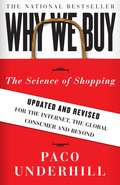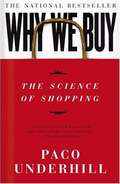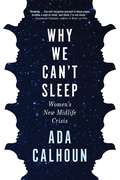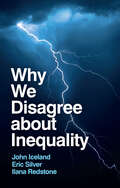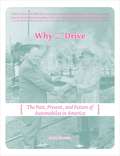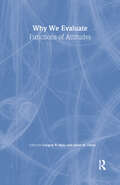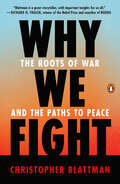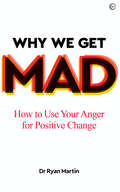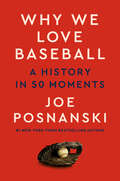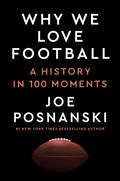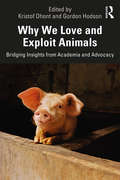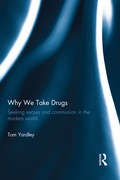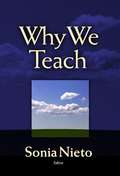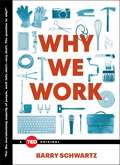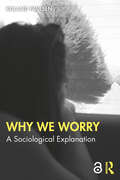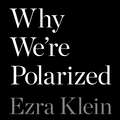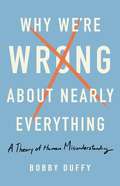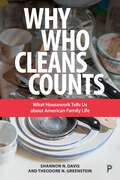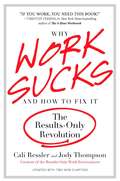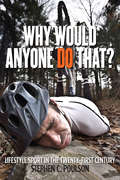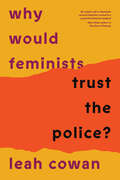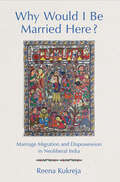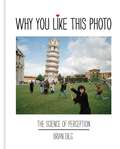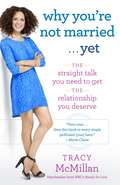- Table View
- List View
Why We Buy: The Science Of Shopping
by Paco UnderhillRevolutionary retail guru Paco Underhill is back with a completely revised edition of his classic, witty bestselling book on our ever-evolving consumer culture -- full of fresh observations and important lessons from the cutting edge of retail, which is taking place in the world's emerging markets.
Why We Buy: The Science of Shopping
by Paco UnderhillUnderhill lays bare the struggle among merchants, marketeers, and consumers for control of the marketplace, explaining shopping phenomena unnoticed by retailers and shoppers alike.
Why We Can't Sleep: Women's New Midlife Crisis
by Ada CalhounWhen Ada Calhoun found herself in the throes of a midlife crisis, she thought that she had no right to complain. She was married with children and a good career. So why did she feel miserable? And why did it seem that other Generation X women were miserable, too? Calhoun decided to find some answers. She looked into housing costs, HR trends, credit card debt averages, and divorce data. At every turn, she saw a pattern: sandwiched between the Boomers and the Millennials, Gen X women were facing new problems as they entered middle age, problems that were being largely overlooked. Speaking with women across America about their experiences as the generation raised to "have it all," Calhoun found that most were exhausted, terrified about money, under-employed, and overwhelmed. Instead of being heard, they were told instead to lean in, take "me-time," or make a chore chart to get their lives and homes in order. In Why We Can't Sleep, Calhoun opens up the cultural and political contexts of Gen X's predicament and offers solutions for how to pull oneself out of the abyss--and keep the next generation of women from falling in. The result is reassuring, empowering, and essential reading for all middle-aged women, and anyone who hopes to understand them.
Why We Disagree about Inequality: Social Justice vs. Social Order
by John Iceland Ilana Redstone Eric SilverWhy do we disagree about the causes of and solutions to social inequality? What explains our different viewpoints on Black Lives Matter, #MeToo, income inequality, and immigration? In this tightly argued book, John Iceland, Eric Silver, and Ilana Redstone show how two clashing worldviews – one emphasizing Social Justice and another Social Order – are preventing Americans from solving their most pressing social problems. The authors show how each worldview provides a different understanding of human nature, morality, social change, and the wisdom of the past. They argue that, before Americans can find lasting solutions to today’s seemingly intractable societal challenges, they will need to recognize that each side possesses a wisdom the other lacks. Only then can we achieve the common ground and consensus we seek.
Why We Drive: The Past, Present, and Future of Automobiles in America
by Andy SingerToday, we're married to our cars. But life behind the wheel of an automobile didn't come naturally to Americans. <P><P>Crooked politicians, unscrupulous businessmen, burning streetcars, and convoluted tax shenanigans are a few of the players in this gripping tale of corruption, greed, and endless miles of asphalt. In Andy Singer's accessible, scandalous tale of motordom, comics, text, and historic photographs tell the story of the rise of the U.S. highway system and the corresponding demise of rail and public transportation. He also explores how we can ditch the car and rebuild a functional transportation system that can bring wealth, happiness, and freedom.
Why We Evaluate: Functions of Attitudes
by Gregory R. Maio James M. OlsonAs the first book to examine the psychological motivations underlying people's attitudes, as well as why people form attitudes, this volume presents empirical research describing theoretical perspectives and practical applications. The editors assembled the leaders in the field to examine the topics of attitude function persuasion, individual-differences approaches, and the role of motivation within a variety of psychological disciplines, including social, personality, consumer, and environmental.
Why We Fight: The Roots of War and the Paths to Peace
by Christopher Blattman&“Why We Fight reflects Blattman&’s expertise in economics, political science, and history… Blattman is a great storyteller, with important insights for us all.&” —Richard H. Thaler, winner of the Nobel Memorial Prize in Economic Sciences and coauthor of Nudge&“Engaging and profound, this deeply searching book explains the true origins of warfare, and it illustrates the ways that, despite some contrary appearances, human beings are capable of great goodness.&”—Nicholas A. Christakis author of Blueprint: The Evolutionary Origins of a Good SocietyDespite the Russian invasion of Ukraine or the fear of another American civil war, most of the time wars don&’t happen, and of the millions of hostile rivalries worldwide, only a fraction erupt into violence. At this moment of crisis in world affairs, this necessary book from a seasoned peacebuilder and acclaimed expert in the field lays out the root causes and remedies for war and explain the reasons why conflict wins over compromise; and how peacemakers can turn the tides once conflict threatens to or becomes war. Its message could not be more urgent right now. Why We Fight draws on decades of economics, political science, psychology, and real-world interventions to lay out the root causes and remedies for war, showing that violence is not the norm; that there are only five reasons why conflict wins over compromise; and how peacemakers turn the tides through tinkering, not transformation. From warring states to street gangs, ethnic groups and religious sects to political factions, there are common dynamics to heed and lessons to learn. Along the way, through Blattman&’s time studying Medellín, Chicago, Sudan, England, and more, we learn from vainglorious monarchs, dictators, mobs, pilots, football hooligans, ancient peoples, and fanatics.What of remedies that shift incentives away from violence and get parties back to dealmaking? Societies are surprisingly good at interrupting and ending violence when they want to—even gangs do it. Realistic and optimistic, this is a book that lends new meaning to the adage &“Give peace a chance.&”
Why We Get Mad: How to Use Your Anger for Positive Change
by Ryan MartinThis is THE book on anger, the first book to explain exactly why we get mad, what anger really is - and how to cope with and use it. Often confused with hostility and violence, anger is fundamentally different from these aggressive behaviours and in fact can be a healthy and powerful force in our lives.What is anger? Who is allowed to be angry? How can we manage our anger? How can we use it? It might seem like a day doesn't go by without some troubling explosion of anger, whether we're shouting at the kids, or the TV, or the driver ahead who's slowing us down. In this book, the first of its kind, Dr. Ryan Martin draws on 20 years plus of research, as well as his own childhood experience of an angry parent, to take an all-round view on this often-challenging emotion. It explains exactly what anger is, why we get angry, how our anger hurts us as well as those around us, and how we can manage our anger and even channel it into positive change. It also explores how race and gender shape society's perceptions of who is allowed to get angry. Dr. Martin offers questionnaires, emotion logs, control techniques and many other tools to help readers understand better what pushes their buttons and what to do with angry feelings when they arise. It shows how to differentiate good anger from bad anger, and reframe anger from being a necessarily problematic experience in our lives to being a fuel that energizes us to solve problems, release our creativity and confront injustice.
Why We Love Baseball: A History in 50 Moments
by Joe PosnanskiNEW YORK TIMES bestsellerWinner of the CASEY Award for Best Baseball Book of the YearNational Sports Media Association Sports Book of the Year An NPR "Book of the Day"#1 New York Times bestselling author Joe Posnanski is back with a masterful ode to the game: a countdown of 50 of the most memorable moments in baseball&’s history, to make you fall in love with the sport all over again. Posnanski writes of major moments that created legends, and of forgotten moments almost lost to time. It's Willie Mays&’s catch, Babe Ruth&’s called shot, and Kirk Gibson&’s limping home run; the slickest steals; the biggest bombs; and the most triumphant no-hitters. But these are also moments raw with the humanity of the game, the unheralded heroes, the mesmerizing mistakes drenched in pine tar, and every story, from the immortal to the obscure, is told from a unique perspective. Whether of a real fan who witnessed it, or the pitcher who gave up the home run, the umpire, the coach, the opposing player—these are fresh takes on moments so powerful they almost feel like myth. Posnanski&’s previous book, The Baseball 100, portrayed the heroes and pioneers of the sport, and now, with his trademark wit, encyclopedic knowledge, and acute observations, he gets at the real heart of the game. From nineteenth-century pitchers&’ duels to breaking the sport&’s color line in the &’40s, all the way to the greatest trick play of the last decade and the slide home that became a meme, Posnanski&’s illuminating take allows us to rediscover the sport we love—and thought we knew. Why We Love Baseball is an epic that ends too soon, a one-of-a-kind love letter to the sport that has us thrilled, torn, inspired, and always wanting more.
Why We Love Football: A History in 100 Moments
by Joe PosnanskiA Kirkus Reviews Most Anticipated Book of the FallA moving celebration of the history of American football from the New York Times bestselling author of Why We Love Baseball After his bestselling home run books Why We Love Baseball and The Baseball 100, Joe Posnanski turns from the national pastime to the number one sport in America. Why We Love Football is Posnanski&’s newest must-have deep dive into the archives and legends of the sport, and the result is a rousing tale of the 100 greatest moments in football lore. This is the best kind of sports writing. Entertaining, enlightening, heartbreaking, hilarious, and always fascinating, these stories of the sport offer a panoramic look across its history. From hidden gems and classic tales to famous moments told from previously unheard perspectives, this book is the football book for even its most ardent fans. From Patrick Mahomes's magic to the Ice Bowl, from Doug Flutie's Hail Mary pass to a plethora of football "miracles," Why We Love Football is an unforgettable, conversational masterpiece you won&’t ever want to end, and a can't-miss take on football from one of the greatest sportswriters of our time.
Why We Love and Exploit Animals: Bridging Insights from Academia and Advocacy
by Kristof Dhont Gordon HodsonThis unique book brings together research and theorizing on human-animal relations, animal advocacy, and the factors underlying exploitative attitudes and behaviors towards animals. Why do we both love and exploit animals? Assembling some of the world’s leading academics and with insights and experiences gleaned from those on the front lines of animal advocacy, this pioneering collection breaks new ground, synthesizing scientific perspectives and empirical findings. The authors show the complexities and paradoxes in human-animal relations and reveal the factors shaping compassionate versus exploitative attitudes and behaviors towards animals. Exploring topical issues such as meat consumption, intensive farming, speciesism, and effective animal advocacy, this book demonstrates how we both value and devalue animals, how we can address animal suffering, and how our thinking about animals is connected to our thinking about human intergroup relations and the dehumanization of human groups. This is essential reading for students, scholars, and professionals in the social and behavioral sciences interested in human-animal relations, and will also strongly appeal to members of animal rights organizations, animal rights advocates, policy makers, and charity workers.
Why We Take Drugs: Seeking Excess and Communion in the Modern World
by Tom YardleyIn older cultures, the use of intoxicant drugs was integrated into the rhythms of social existence and bounded by rituals and taboos that ensured their dangerous forces were contained and channelled. In modern western societies, by contrast, the state and the institutions of society have washed their hands of any responsibility for assimilating the desire for intoxication into social existence, and by doing so have sponsored a free-for-all that has often had disastrous consequences for individuals and communities alike. Why We Take Drugs provides a timely intervention in the growing debate about the wisdom of the ongoing ‘war on drugs’. Rather than adopting the assumption that drug and alcohol use is a problem that poses a threat to society, this book makes a case for the idea that society is a problem for intoxicant drug use and that it is society that poses a threat, by denying those who seek intoxication a legitimate and socially sanctioned space in which to experience these altered states. Scholarly yet approachable, it provides a new understanding of the meaning and role of intoxicant drug use in contemporary society, setting an in-depth phenomenological analysis of intoxication as an embodied experience within a wide sociological, anthropological and historical context. These ideas are brought to life by intimate and revealing accounts of ordinary drug users’ experiences with a wide range of substances. This book will appeal to a wide range of students and scholars throughout the social sciences, particularly in the areas of drug and alcohol studies, body studies, cultural studies, anthropology and philosophy.
Why We Teach
by Sonia NietoThis book includes reflections by teachers who work in U.S. public elementary, middle, and high schools in a variety of settings ,in which they talk about their motivations for coming into teaching, and their thoughts about the profession itself.
Why We Work: The Terrorist's Son, The Mathematics Of Love, The Art Of Stillness, The Future Of Architecture, Beyond Measure, Judge This, How We'll Live On Mars, Why We Work, The Laws Of Medicine, And Follow Your Gut (TED Books)
by Barry SchwartzAn eye-opening, groundbreaking tour of the purpose of work in our lives, showing how work operates in our culture and how you can find your own path to happiness in the workplace.Why do we work? The question seems so simple. But Professor Barry Schwartz proves that the answer is surprising, complex, and urgent. We've long been taught that the reason we work is primarily for a paycheck. In fact, we've shaped much of the infrastructure of our society to accommodate this belief. Then why are so many people dissatisfied with their work, despite healthy compensation? And why do so many people find immense fulfillment and satisfaction through "menial" jobs? Schwartz explores why so many believe that the goal for working should be to earn money, how we arrived to believe that paying workers more leads to better work, and why this has made our society confused, unhappy, and has established a dangerously misguided system.Through fascinating studies and compelling anecdotes, this book dispels this myth. Schwartz takes us through hospitals and hair salons, auto plants and boardrooms, showing workers in all walks of life, showcasing the trends and patterns that lead to happiness in the workplace. Ultimately, Schwartz proves that the root of what drives us to do good work can rarely be incentivized, and that the cause of bad work is often an attempt to do just that. How did we get to this tangled place? How do we change the way we work? With great insight and wisdom, Schwartz shows us how to take our first steps toward understanding, and empowering us all to find great work.
Why We Worry: A Sociological Explanation
by Roland PaulsenSomething must have changed in society. We weren’t always this worried. Not always caught up in disastrous scenarios in our minds. What is this nagging voice in our head? Why won’t it stop, and why are we so fixated on it?In Why We Worry, Roland Paulsen paints a broad picture of the cultural variations and historical evolution of anxiety. Through this lens, he invites readers to explore the paradox of how material wealth has enriched our lives in every aspect except one: our mental well-being.This book offers empirically grounded insights into the sociological underpinnings of issues relating to worry. As such, it is suitable for undergraduate students in psychology, sociology, and medicine – and anyone who has ever been trapped in rumination.
Why We're Polarized
by Ezra KleinA BARACK OBAMA AND A BILL GATES SUMMER READING PICK 2022A NEW YORK TIMES AND WALL STREET JOURNAL BESTSELLER'This book helped me understand modern politics better' - Bill Gates, Summer Reading Pick 2022 'Superbly researched and written' - Francis Fukuyama, The Washington Post 'It's been a long time since I learned so much from one book.' - Rutger Bregman author of Utopia for Realists America's political system isn't broken. The truth is scarier: it's working exactly as designed. In Why We're Polarized, Ezra Klein reveals the structural and psychological forces behind America's deep political divisions, revealing how a system filled with rational, functional parts can combine into a dysfunctional whole. Neither a polemic nor a lament, this book offers a clear framework for understanding everything from Trump's rise to the Democratic Party's leftward shift to the politicisation of everyday culture. Klein shows how and why American politics polarised in the twentieth century, what that polarisation did to Americans' views of the world and one another, and how feedback loops between polarised political identities and polarised political institutions drive the system toward crisis. This revelatory book will change how you look at politics, and perhaps at yourself.
Why We're Wrong About Nearly Everything: A Theory of Human Misunderstanding
by Bobby DuffyA leading social researcher explains why humans so consistently misunderstand the outside world How often are women harassed? What percentage of the population are immigrants? How bad is unemployment? These questions are important, but most of us get the answers wrong. Research shows that people often wildly misunderstand the state of the world, regardless of age, sex, or education. And though the internet brings us unprecedented access to information, there's little evidence we're any better informed because of it. We may blame cognitive bias or fake news, but neither tells the complete story. In Why We're Wrong About Nearly Everything, Bobby Duffy draws on his research into public perception across more than forty countries, offering a sweeping account of the stubborn problem of human delusion: how society breeds it, why it will never go away, and what our misperceptions say about what we really believe. We won't always know the facts, but they still matter. Why We're Wrong About Nearly Everything is mandatory reading for anyone interested making humankind a little bit smarter.
Why Who Cleans Counts: What Housework Tells Us about American Family Life
by Shannon Davis Theodore GreensteinEvery household has to perform housework, and researchers know a lot about what predicts who does which chores, drawing frequently from theoretical explanations that highlight the importance of power dynamics. This book moves beyond the existing scholarship by using quantitative, nationally representative survey data to theorize about how power dynamics as reflected in housework performance help us understand broader family variations. The authors investigate how knowing who cleans the house explains how households of differing forms, demographics and compositions operate, both cross-sectionally and over the life course of the household.
Why Work Sucks and How to Fix It: The Results-Only Revolution
by Jody Thompson Cali ResslerDo you hate cramming all of your errands into the weekend? Do you resent having to beg permission to watch your kid's weekday soccer game? <P><P>Are you tired of seeing people who aren't very good at their jobs get promoted because they arrive early and stay late? There's got to be a better way--and there is! Cali Ressler and Jody Thompson show that everyone benefits when we change the focus from hours to outcomes. It's just that our traditional definition of work--Monday through Friday, nine to five--doesn't make sense in the always-on global economy. So, Ressler and Thompson created the Results-Only Work Environment. In a ROWE, you control when, where, and how long you work. As long as you meet your objectives, the way you spend your time is entirely up to you. Suddenly, work isn't a place you go, it's a thing you do. In a ROWE, there are no mandatory meetings or fixed schedules. You stop doing any activity that wastes time, and no one criticizes you for "leaving early" or "coming in late." If you do your best work at midnight or on Sundays, go for it! ROWE sounds like a fantasy, but Ressler and Thompson have already made it a reality at Best Buy, a Fortune 100 company. They have proven that ROWE not only makes employees happier but also delivers better results. And now the authors are helping companies implement ROWE nationwide. Infused with passion and common sense, Why Work Sucks and How to Fix It will change the way you think about your job, your company, and your quality of life. Read it and join the revolution!
Why Would Anyone Do That?: Lifestyle Sport in the Twenty-First Century
by Stephen C. PoulsonTriathlons, such as the famously arduous Ironman Triathlon, and "extreme" mountain biking--hair-raising events held over exceedingly dangerous terrain--are prime examples of the new "lifestyle sports" that have grown in recent years from oddball pursuits, practiced by a handful of characters, into multi-million-dollar industries. In Why Would Anyone Do That? sociologist Stephen C. Poulson offers a fascinating exploration of these new and physically demanding sports, shedding light on why some people find them so compelling. Drawing on interviews with lifestyle sport competitors, on his own experience as a participant, on advertising for lifestyle sport equipment, and on editorial content of adventure sport magazines, Poulson addresses a wide range of issues. He notes that these sports are often described as "authentic" challenges which help keep athletes sane given the demands they confront in their day-to-day lives. But is it really beneficial to "work" so hard at "play?" Is the discipline required to do these sports really an expression of freedom, or do these sports actually impose extraordinary degrees of conformity upon these athletes? Why Would Anyone Do That? grapples with these questions, and more generally with whether lifestyle sport should always be considered "good" for people. Poulson also looks at what happens when a sport becomes a commodity--even a sport that may have begun as a reaction against corporate and professional sport--arguing that commodification inevitably plays a role in determining who plays, and also how and why the sport is played. It can even help provide the meaning that athletes assign to their participation in the sport. Finally, the book explores the intersections of race, class, and gender with respect to participation in lifestyle and endurance sports, noting in particular that there is a near complete absence of people of color in most of these contests. In addition, Poulson examines how concepts of masculinity in triathlons have changed as women's roles in this sport increase.
Why Would Feminists Trust the Police?: A tangled history of resistance and complicity
by Leah CowanA tangled history of feminism&’s complicity and resistanceEvery week it seems there is a fresh scandal involving abhorrent, racist, misogynist behaviour by police officers. Yet these are the very people women are supposed to approach for help when faced with violence. And many feminists, hoping to use the criminal justice system to protect women, fight for stronger laws and longer sentences for those who harm them.Why Would Feminists Trust the Police? traces the history of British feminism&’s alliances and struggles with the law and its enforcers. Drawing on the legacy of Black British feminism, Leah Cowan reminds us of the vibrant and creative alternatives envisioned by those who have long known the truth: the police aren&’t feminist, and the law does not keep women safe.
Why Would I Be Married Here?: Marriage Migration and Dispossession in Neoliberal India
by Reena KukrejaWhy Would I Be Married Here? examines marriage migration undertaken by rural bachelors in North India, unable to marry locally, who travel across the breadth of India seeking brides who do not share the same caste, ethnicity, language, or customs as themselves. Combining rich ethnographic evidence with Dalit feminist and political economy frameworks, Reena Kukreja connects the macro-political violent process of neoliberalism to the micro-personal level of marriage and intimate gender relations to analyze the lived reality of this set of migrant brides in cross-region marriages among dominant-peasant caste Hindus and Meo Muslims in rural North India. Why Would I Be Married Here? reveals how predatory capitalism links with patriarchy to dispossess many poor women from India's marginalized Dalit and Muslim communities of marriage choices in their local communities. It reveals how, within the context of the increasing spread of capitalist relations, these women's pragmatic cross-region migration for marriage needs to be reframed as an exercise of their agency that simultaneously exposes them to new forms of gender subordination and internal othering of caste discrimination and ethnocentrism in conjugal communities. Why Would I Be Married Here? offers powerful examples of how contemporary forces of neoliberalism reshape the structural oppressions compelling poor women from marginalized communities worldwide into making compromised choices about their bodies, their labor, and their lives.
Why You Like This Photo: The science of perception
by Brian DilgCombining science and photography, Brian Dilg explores the reasons behind Why You Like This Photo.
Why You Like This Photo: The science of perception
by Brian DilgCombining science and photography, Brian Dilg explores the reasons behind Why You Like This Photo.
Why You're Not Married . . . Yet: The Straight Talk You Need to Get the Relationship You Deserve
by Tracy McmillanThis paperback edition includes an exclusive conversation between Bill and Giuliana Rancic, hosts of NBC's Ready for Love, and Tracy McMillan, one of its expert matchmakers. This new relationship show features three of America's most eligible guys searching for their soul mates. If you're looking to get married and you're not, there's most likely a very good reason: you. Hey, you're certainly not a bad person! You just haven't yet become the woman you need to be in order to have the partnership you want. That's where this book comes in. Based on her wildly popular Huffington Post article, Tracy McMillan's Why You're Not Married . . . Yet dishes out no-holds-barred practical wisdom for women hoping to head down the aisle. And this new edition features even more candid advice and sisterly insight. McMillan points out the behaviors that might be in your blind spot and shows you how to adjust them to get the relationship you deserve. Do any of these chapter headings sound familiar? * You're a Bitch: How defensiveness can hide behind a tough exterior, and why being nice is never a sign of weakness. * You're a Liar: How to stop lying to men--and get honest with yourself--about the kind of relationship you really want. * You're Selfish: The big secret about marriage: It's about giving something, not getting it. A funny, insightful guide, Why You're Not Married . . . Yet will change your life and the way you think about relationships, and it may very well lead you down the aisle. "Very wise . . . Give this book to every single girlfriend [you] have."--Marie Claire "Equal parts BFF, boot-camp instructor, and relationship guru, Tracy McMillan will change the way you think about yourself and your relationships. This book is for every woman out there who wants to have a great marriage."--Ricki Lake't so much about getting a husband as it is about shifting your perspective on being a wife. Here's a funny, insightful guide to becoming a more loving woman and creating a more loving marriage--even if you're already partnered. It's a book that will change your life and the way you think about relationships, and it may very well lead you down the aisle.
